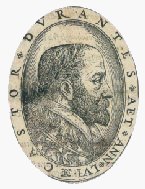Castore Durante
Castore Durante (1529–1590) was an Italian physician, botanist, and writer, known for his work in the field of medicine and particularly for his contributions to botany. His most notable work is Herbario Nuovo, a comprehensive herbal published in 1585, which detailed the medicinal properties of plants and became a reference work in the field of pharmacology and herbal medicine.
Biography[edit | edit source]
Castore Durante was born in Gualdo Tadino, Umbria, in the Papal States. He pursued his education in the field of medicine and became a physician. Durante served as a personal physician to several cardinals and was highly regarded in his profession. His career was marked by a deep interest in the natural world, particularly in the medicinal properties of plants.
Herbario Nuovo[edit | edit source]
Durante's Herbario Nuovo was a landmark publication in the field of botany and herbal medicine. The work was illustrated with detailed woodcuts of plants, making it not only a valuable scientific resource but also a work of art. It described the characteristics, habitats, and medicinal uses of a wide range of plants, based on both classical sources and Durante's own observations.
The Herbario Nuovo was widely acclaimed and translated into several languages, reflecting its importance in the advancement of botanical science and its practical application in medicine. Durante's work contributed significantly to the knowledge of plant-based remedies and the development of pharmacology as a scientific discipline.
Legacy[edit | edit source]
Castore Durante's contributions to botany and medicine were significant during his lifetime and have continued to be recognized by scholars and practitioners. His detailed observations and descriptions of plants laid the groundwork for future botanical studies and the use of plants in medicine. The Herbario Nuovo remains a valuable historical document, reflecting the state of botanical and medical knowledge in the late Renaissance.
Durante's work also highlights the intersection of science, art, and medicine during the Renaissance, demonstrating the holistic approach to knowledge and understanding that characterized the period. His legacy is preserved in the continued study and appreciation of his work in the fields of botany, pharmacology, and the history of medicine.
Search WikiMD
Ad.Tired of being Overweight? Try W8MD's physician weight loss program.
Semaglutide (Ozempic / Wegovy and Tirzepatide (Mounjaro / Zepbound) available.
Advertise on WikiMD
|
WikiMD's Wellness Encyclopedia |
| Let Food Be Thy Medicine Medicine Thy Food - Hippocrates |
Translate this page: - East Asian
中文,
日本,
한국어,
South Asian
हिन्दी,
தமிழ்,
తెలుగు,
Urdu,
ಕನ್ನಡ,
Southeast Asian
Indonesian,
Vietnamese,
Thai,
မြန်မာဘာသာ,
বাংলা
European
español,
Deutsch,
français,
Greek,
português do Brasil,
polski,
română,
русский,
Nederlands,
norsk,
svenska,
suomi,
Italian
Middle Eastern & African
عربى,
Turkish,
Persian,
Hebrew,
Afrikaans,
isiZulu,
Kiswahili,
Other
Bulgarian,
Hungarian,
Czech,
Swedish,
മലയാളം,
मराठी,
ਪੰਜਾਬੀ,
ગુજરાતી,
Portuguese,
Ukrainian
Medical Disclaimer: WikiMD is not a substitute for professional medical advice. The information on WikiMD is provided as an information resource only, may be incorrect, outdated or misleading, and is not to be used or relied on for any diagnostic or treatment purposes. Please consult your health care provider before making any healthcare decisions or for guidance about a specific medical condition. WikiMD expressly disclaims responsibility, and shall have no liability, for any damages, loss, injury, or liability whatsoever suffered as a result of your reliance on the information contained in this site. By visiting this site you agree to the foregoing terms and conditions, which may from time to time be changed or supplemented by WikiMD. If you do not agree to the foregoing terms and conditions, you should not enter or use this site. See full disclaimer.
Credits:Most images are courtesy of Wikimedia commons, and templates Wikipedia, licensed under CC BY SA or similar.
Contributors: Prab R. Tumpati, MD

